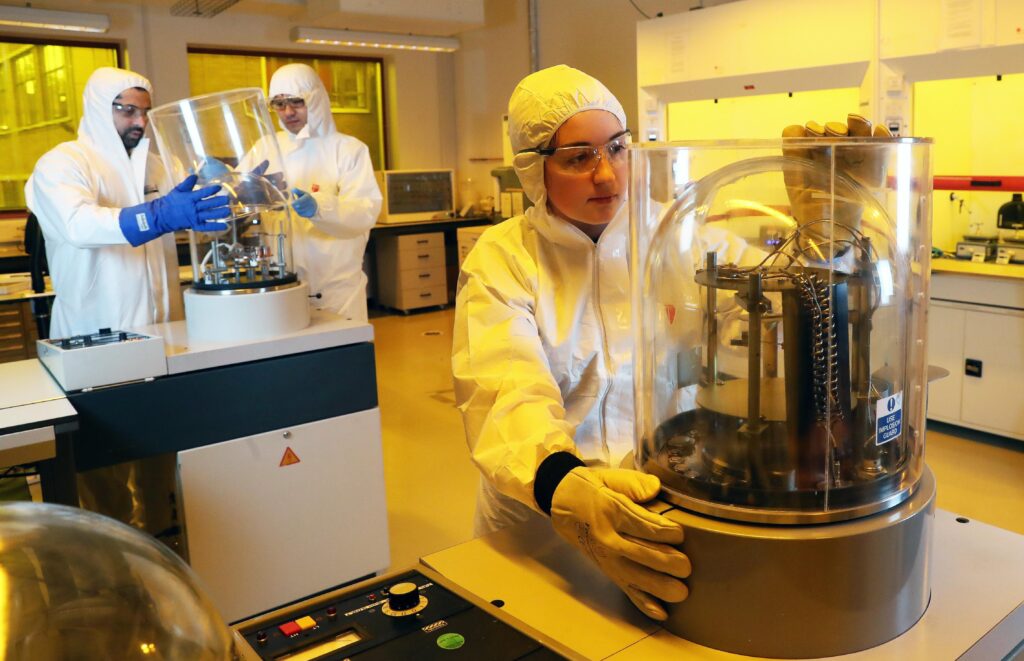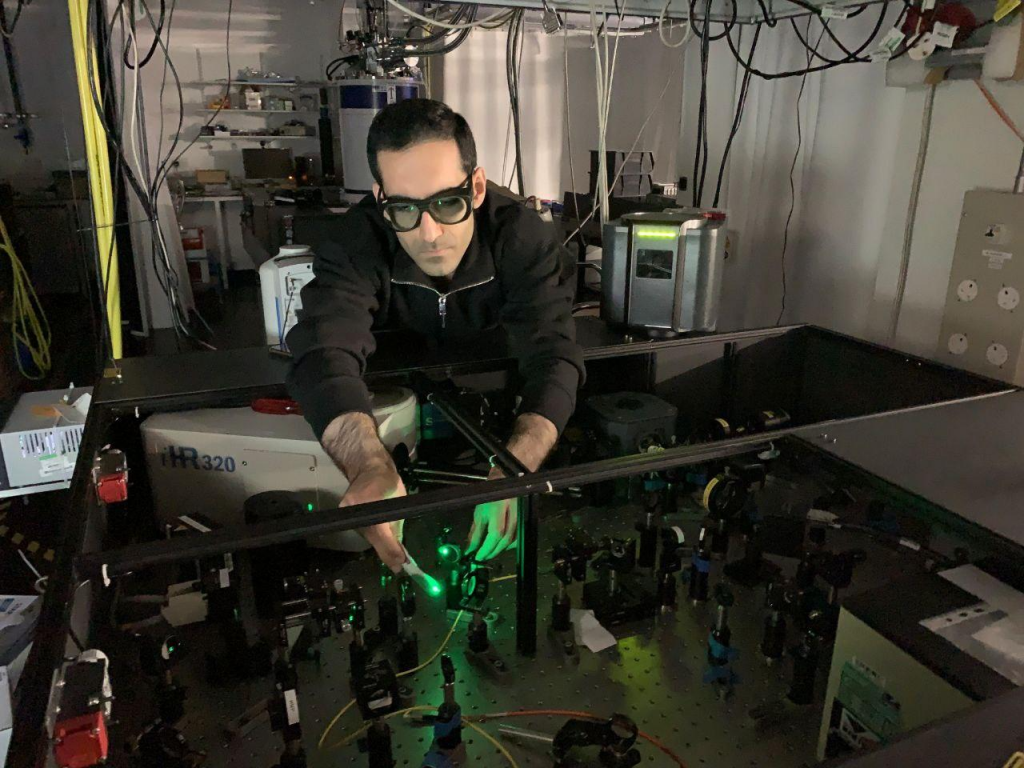The EPSRC Centre for Doctoral Training (CDT) in Compound Semiconductor Manufacturing (CSM) is led by Cardiff University in partnership with the University of Manchester, University of Sheffield, and University College London.
We offer a unique programme that provides a holistic understanding of the entire manufacturing process as well as expertise in at least one stage. We believe that this approach is key to developing you as a future leader of compound semiconductor manufacturing, whether you choose to pursue a career in industry or academia or both.
We offer fully-funded PhDs with an enhanced stipend to eligible students. This is currently the UKRI Rate of £20,780 plus £2,000 CDT enhancement. Students who do their PhDs at UCL also receive a London allowance of £2,000. Fees are paid on your behalf.
Our Remit:
The aim of the CDT is to provide intellectually challenging and industrially relevant training that facilitates the transfer of research into production.
Our PhD projects exemplify the remit of the CDT in that research will involve:
- radically boosting the uptake and application of CS technology in applications through the ability to apply the manufacturing approaches of Silicon to CS,
- supporting UK companies further along the supply chain by being able to exploit the highly advantageous and energy efficient electronic, magnetic, optical and power handling properties of CS
- pioneering novel integrated functionality such as sensing, data processing and communication while maximising the resource and energy efficiency of the manufacturing process

Why choose a PhD in Compound Semiconductor Manufacturing?
Compound Semiconductor (CS)
Compound Semiconductor (CS) materials are a Key Enabling Technology at the heart of
modern society, supporting our connected world, our health, our security and our environment.
They are core to the development of, for example, the 6G network, sensors for autonomous
vehicles, the internet of things (IOT), future displays, satellite communications, photovoltaics,
power electronics for the next generation of electric vehicles and new imaging techniques. Our CDT will provide the step change in CS manufacturing necessary to realise the new technologies, with a focus on embedding energy and resource efficiency into these manufacturing processes. Our vision is to ensure the UK’s research strength in CS is realised in energy efficient and manufacturable approaches so that the UK can be at the forefront of the vast new opportunities that CSs provide.
The government’s National semiconductor strategy – GOV.UK (www.gov.uk ), published in May 2023, outlines why a strong CS sector in the UK is so important to our technological growth, supply chains and national security.
The next generation of these technologies can only be achieved with a step change in CS manufacturing. As reported in a 2018 survey by the UK Electronics Skills Foundation, the future growth for high-value jobs within the CS Cluster core partners is forecasted to be high with almost a thousand additional jobs likely to be created by 2024. Employers saw the future demand for staff educated to PhD level and our Centre for Doctoral Training has been welcomed by them.

Why choose a PhD in an EPSRC Centre for Doctoral Training?
CDTs have developed over the last 15 years. They have been supported by the Engineering and Physical Sciences Research Council (EPSRC) because they create a strong cohort of researchers who develop skills beyond the specialist topic of their PhD and develop networks across universities and industry.
They provide a supportive and exciting environment for students, creating new working cultures and forging lasting links with industry. CDTs offer many benefits over ‘stand-alone’ PhDs, highlighted in this article by FindaPhD, one of the most significant of which is targeted training:
“In addition to monetary support, a CDT will also provide research training throughout your PhD. This can vary between training centres, but it will teach technical and transferable skills relevant for a doctoral researcher. Training in core professional skills – project management, teaching, writing and presenting – aims to enhance employability and is useful for future careers in both academic and industry.
The training provided by a CDT studentship may have several advantages over a traditional PhD programme. The collaborative nature of a CDT means there may also be emphasis on multi-disciplinary or inter-disciplinary knowledge, training and research. Due to CDTs being dedicated for specific research output, the training will be tailored to address the skills needed at the doctoral level. In a CDT, students may work more closely with industry, and therefore develop in industry-relevant skills. The cohort-based approach may also mean that there should be shared training and development”

Why choose EPSRC CDT for Compound Semiconductor Manufacturing?
The CSM CDT undertakes a multi-institutional, cohort-based training approach with strong industrial partnership to address the skills requirement of the CS manufacturing sector and to do this in a holistic manner, rather than have isolated individual students being trained in only the specialised aspects of CS research. We aim to provide a cohort-based training that will maintain scholarly depth in a specialism and provide an understanding of the issues throughout the manufacturing process, fully equip the students with transferable skills and supply a future-ready breadth of practical skills. We deliver appropriate hands-on experimental and theoretical training related to CS device and system level design and implementation and nurture in the cohort the capacity to develop innovative alternatives to improve the current capabilities in a range of CS enabled sectors like Energy and Healthcare Technology. This approach contributes to more rounded individuals ready for careers in either academia or industry.
Our CDT is embedded in a vibrant and well-funded cluster dedicated to CS technologies, building on existing academic and industrial capability and manufacturing excellence. We are drawing on the resources and expertise in the cluster, giving you access to the huge range of expertise and opportunities to develop a challenging research project, build a network and contextualise your work, for example:
- Institute for Compound Semiconductors at Cardiff University with a new £80M Translational Research Facility to house more than 100 researchers.
- The Compound Semiconductor Centre Ltd., a joint venture between Cardiff University and IQE Plc with 75 staff dedicated to CS materials research and manufacturing in Cardiff. The CSC typically concentrates on delivering opportunities that are 1-3 years from market exploitation through well-defined delivery paths made possible by effective collaboration with our project partners.
- The Catapult in Compound Semiconductor Applications, which has over 80 highly skilled applications engineering specialists
- The EPSRC funded Future Compound Semiconductor Manufacturing Hub, led by CU in collaboration with Manchester, Sheffield and UCL to address the challenges of manufacturing scale-up of novel CS materials technology.
- The CS Foundry is the first flagship project of the Cardiff Region City Deal, to house the world’s largest epi-foundry operated by IQE Plc and the HQ of the CSA Catapult. This £38M public investment has unlocked £375M private investment and is currently in the process of scaling to 2000 jobs in the wider supply chain.
- Excellent research facilities and leading researchers at all four University partners.
Find out more about compound semiconductors in this Cardiff University CPD Virtual Summer School ‘Inside the Mysterious World of Compound Semiconductors’ with Chris Meadows of CS Connected.